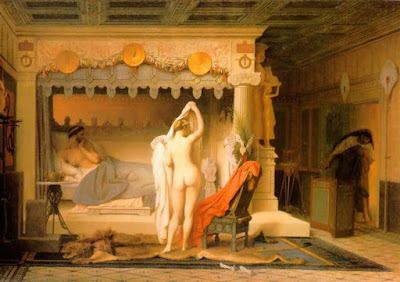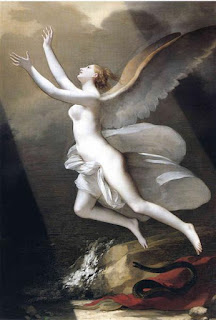 |
| The Republic Jean-Leon Gerome source Wikiart |
Book II:
 |
| Pleasure (1900) Eugene de Blaas source Wikiart |
Glaucon protests that Socrates has not made a reasonable enough explanation of why Justice is preferable to injustice. First, he says, there are three classes of good:
- Pleasures that are enjoyed for themselves
- Good that is valued because of its consequences
- Good that is desirable both for itself and what comes out of it.
Then he tells a story of a shepherd called Gyges and his magic ring that helped him to become king (see Ovid’s Metamorphoses, Book I). If one could act however one wanted without threat of punishment or recrimination, wouldn’t everyone act thus? Why should Glaucon be just if he can get away with being unjust? (Essentially he is asking: What is Justice on the level of an individual?) It’s only our fear of getting caught that holds us to the course of Justice, and Justice itself is a social construct. The Social Contract theory implies that people don’t really want to be just but because chaos would result from such a “free-for-all” society and therefore we enter into a “social contract” where we give up free reign on our desires for a greater good; certain rules are imposed on an individual that aren’t part of their nature for a common good.
 |
| King Candaules of Lydia (1858) Jean-Leon Gerome source Wikiart |
 |
| The Soul Breaking the Bonds … Pierre-Paul Prud’hon source Wikiart |
Glaucon is perplexed. What about the luxuries? What Socrates has described only meets basic animal needs. Socrates allows Glaucon his desires and adds in his wishes, but emphasizes that adding meat and sweets will cause inflammation and surely the physicians will be in more demand — he was obviously initially advocating vegetarianism for health. Interesting …. In any case, all these luxuries will increase competition, and therefore eventually war is inevitable. Socrates will not say whether war is good or bad, he only examines the effect it will have on the Republic. The city will therefore need an efficient soldier but they too must be specialists in their field. However, they must also exhibit a certain temperament, one that is combative and even aggressive, yet tempered by courage of spirit and controlled by rational behaviour. Given their character and profession, they must be trained carefully to ensure they do not harm their own people. How is that to be done? Through education. They must be trained to be hostile to their enemies and benevolent to their people, not indiscriminate with their behaviour.
I had to admire Socrates in this section. Even though he at first appears to advocate a simplistic city that he feels is the most healthy and functional, he bows to Glaucon’s wishes for luxuries, perhaps realizing that it would not be sensible to attempt to eradicate these human desires, and therefore, gives up his “perfect” city for one that is more realistic. Plato is realizing the flaws in human nature and attempting to work within them. Quite wise, I would say.
⇐ Book I Book III ⇒


Just get rid of all cities. Pastoral wonderlands wher'eer the eye beholds.
Yeah……
But really, I do advocate the first part. Pave the Planet is my mantra…
I like your first suggestion! Life would be simpler in many ways and perhaps more enjoyable in a broad sense.
Pave the planet?!! Gasp! Is that because of your job? Has all the ashphalt you look at melted your brain? LOL! 😉 Where is your "green" spirit?
Socrates realized, maybe, that he was being too much of an absolutist… viewing the world around him, he must have seen that chaos reigned almost everywhere and that the population desperately needed a strong hand; at the same time it required careful handling…
i've been impressed in my reading that he went to so much effort to try and create a stable society, even in spite of the craziness he saw around him….
tho i have wondered if his philosophies had anything to do with the tyrannies Greece suffered under for so many years…
Yes, the tyrannies and the Peloponnesian War must have had a huge impact on him. Not to mention how quickly the democracy fell with Alcibiades and his oligarchies. I wish we knew more about both these characters (Socrates & Plato).
I do wonder if he really believed a stable society was possible or his Republic was merely the best he could come up with given our capricious natures. Hmmm ….